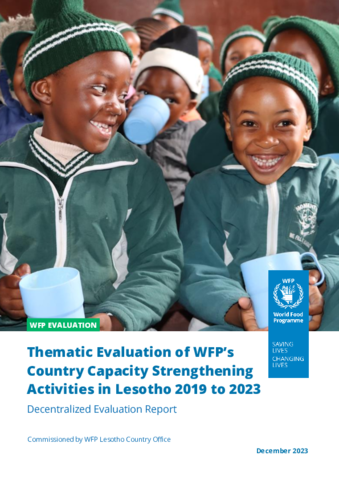
The purpose of the evaluation was to assess the effectiveness of CCS interventions, recommending adjustments for future implementation. The evaluation made considerations to environmental risk and gender-related issues, to supplement evidence to the government and its partners' capacity to achieve zero hunger. It focused on assessing the relevance, coherence, effectiveness, efficiency, sustainability and impact addressing overarching evaluation questions focused on how CCS interventions supported the government of Lesotho and its partners to achieve zero hunger. The evaluation covered the following activities: school feeding, nutrition, food assistance for assets, food and nutrition security analysis & diagnostic, capacity strengthening.
Key evaluation findings included:
- Contextual relevance: CCS activities demonstrated responsiveness to contextual needs related to food security, nutrition, and early warning/disaster preparedness.
- Gender mainstreaming: capacity strengthening initiatives showcased a sound gender analysis, with all activities integrating specific measures for the promotion of Gender Equality and Women Empowerment (GEWE).
- Environmental risk consideration: CCS activities exhibited a central focus on addressing environmental risk, with clear design informed by environmental risk analyses conducted at multiple levels.
- Alignment with national priorities: while CCS activities aligned well with national priorities in the National Strategic Development Plan (NSDP II) and sectoral policies, some discrepancies were noted in the updated school feeding policy.
- Outcome measurement challenges: determining the effectiveness of CCS interventions faced challenges due to the absence of appropriate output and outcome indicators.
Key recommendations from the evaluation included:
- Holistic approach transition: advocating for a continued shift towards a holistic approach that supports national systems working towards the achievement of zero hunger.
- Partnership strategy development: emphasizing the expansion and strengthening of partnerships by developing a comprehensive partnership strategy.
- Enhanced monitoring and evaluation: advocating for continuous improvement in monitoring and evaluation practices, ensuring that evidence informs decision-making for CCS activities.
- Leadership and ownership promotion: promoting strengthened leadership and ownership among key government institutions and stakeholders.
- Internal capacity strengthening: strengthening the internal capacity of the WFP Lesotho Country Office to deliver and monitor CCS activities.
